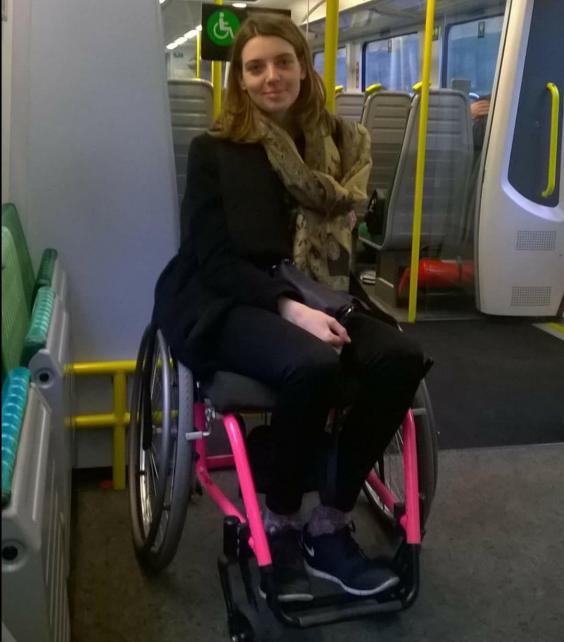 |
| Photo source: dezeen.com |
Though, the aisle chair doesn't have a head rest, arm rest and other essential support systems that may be required by persons with disabilities with high support needs, however, it can be big relief for elders and other reduced mobility passengers who can manage without arm rest etc.
Amer Siddiqui and Ali Asgar Salim were named runners up in the 2018 James Dyson Award for the Air Chair, which slides over the top of standard aeroplane seats and stays in place for the duration of the flight.
The award recognises the best in student design from around the world and is judged by the British inventor.
Use of the Air Chair would allow disabled passengers to remain in a single seat for their entire journey, from departure gate to arrivals hall. Usually, passengers requiring a wheelchair would switch to a fixed seat once on board the plane.
 |
| Photo source: dezeen.com |
"The current plight of wheelchair air travellers is extremely deplorable," said the two American University of Sharjah students. "The present solutions are exceedingly restricting and humiliating. They only provide limited mobility and accessibility."
To create a chair that could slip over an existing seat like a glove, Siddiqui and Salim gave their design a hollowed-out "C" shape, with small, spherical rear wheels that fit underneath a standard aeroplane seat.
A locking mechanism secures the Air Chair in place, allowing the passenger to access the provided seatbelt and reach the life vest if required.
The design is also narrow enough to pass through aisles — another point of difference from standard wheelchairs. It is foldable and electric.
The James Dyson Award described the Air Chair as a "bold attempt" to improve the flying experience for disabled passengers.
While the design is still in the concept stage, Siddiqui and Salim now have £7,000 in prize money from the awards to put towards prototyping. They'll further test and analyse their design, taking into account aviation regulations from around the world.
"Being selected international runner-up by a technology pioneer like James Dyson is a true vindication of our idea," said the students. "This achievement has spurred us on to continue developing Air Chair."
"Through the exposure of our concept, we hope to secure even more investment to kickstart the prototyping phase; we'll feel restless until we see Air Chair in airports across the globe."
The international winner in this year's James Dyson Award was the O-Wind Turbine, designed by UK students Nicolas Orellana and Yaseen Noorani for use in dense city environments.
The James Dyson Awards is open to current and recent design and engineering students from around the world, with a final winner emerging following heats in 27 countries. Entrants are asked to design something that solves a problem, big or small.
Participating countries in this, the 14th year of the awards, included the USA, China, India, Mexico, Russia and the Philippines.
The awards are one of several educational initiatives run by Dyson, who is best known for his eponymous vacuum cleaners as well as blade-less fans and hairdryers. The inventor and Brexiteer also opened his own university, the Dyson Institute, in 2017, starting with an intake of 33 undergraduate engineers.
Other studios who have looked into the issue of air travel for disabled passengers include Priestmangoode. The studio used the London 2012 Paralympics as the jumping off point to design the Air Access chair, a seat that passengers with reduced mobility can sit in from the departure lounge through to their destination.
Source: Dezeen dot com


